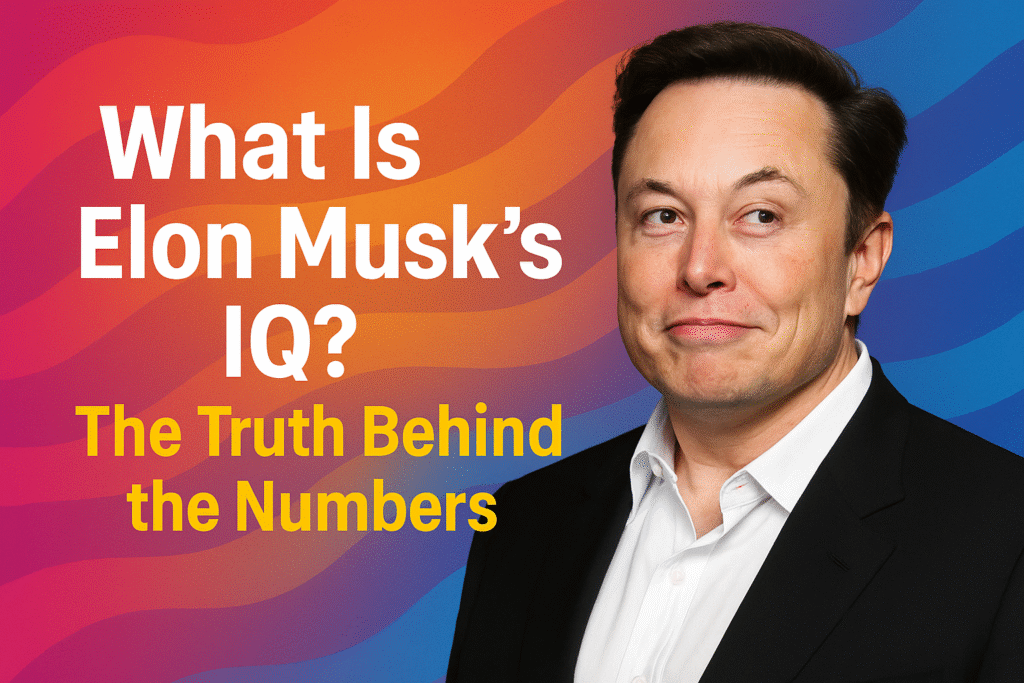What Is Elon Musk’s IQ? Sorting Fact from Speculation
Elon Musk’s IQ has never been published, but according to multiple informal estimates it ranges from approximately 155–160. His estimated IQ scores put him in a tie with somebody like Larry Page or Stephen Hawking since he was a child. These often self-reference SAT–IQ correlations (Musk supposedly scored 1400s in the late 1980s, suggesting a mid-130s IQ), along with achievement-based inferences based on his technical leadership at SpaceX, Tesla, Neuralink, and other companies.
The dissenting theory from biographer Seth Abramson that Musk’s intelligence might not even come close to 110 adds an extra layer of polarization. Anyways, Musk himself doesn’t find IQ to be a particularly useful metric.
Key point: No good official IQ test score is available for Elon Musk.
Where the Estimates Come From
- Academic & peer comparisons: UPenn performance, inferential and cohort comparisons with physics.
- SAT correlation: A 1400 SAT is indicative of a mid-130s IQ
- Achievement analysis: Interdisciplinary execution (Aerospace, EVs, etc.) as a proxy of high general intelligence.
- Opposing views: There is a small minority who places his IQ around ~100–110 which directly contradicts traditional beliefs.
The big names: Charlie Munger (the trader and Warren Buffett’s business partner) shouted out Musk as a genius while warning that overconfidence is ever dangerous, making the point here that people can love outcomes but argue about the numbers.
Musk on IQ
Musk has claimed to refer to an IQ of 155, yet maintains that “IQ is not that useful” or predictive of success in contrast with the following traits:
- Creative problem-solving
- Relentless work ethic
- Innovative thinking and risk tolerance
What the Scores Mean (and Miss)
How IQ tests work: Modern IQ utilizes deviation scoring (mean 100, SD 15). Up to 68% of us fall between 85–115. “Genius-level” tends to get informally floated at 140+, but results as they say “may vary.”
Reliability limits:
- Scores may vary ~±10 points from sitting to sitting.
- Accuracy deteriorates close to the extremes .
- IQ measures certain cognitive factors, but does not cover creativity, social intelligence, grit or practical judgment.
Posterior line: IQ is one lens, not the full picture.
Proof of High-Level Problem-Solving
Early aptitude & education
- Learned to code fairly young; studied physics and economics at UPenn; accepted into the Stanford materials science PhD (he didn’t go, he did four startups).
Technical breadth
- Directed development teams (Falcon series, Dragon missions, Starlink) at SpaceX along with EV manufacturing and energy systems at Tesla.
Different problem-solving style
- First-principles thinking: The practice of demoting all problems into their most fundamental parts, stripping away assumptions.
- bound analysis & idealizations: tests limits optimizes end-states and works backwards.
- Optimization attention: Methodically interrogates constraints before making changes.
Endorsements from leading engineering and scientific organizations affirm scale execution.
Beyond IQ: Other Dimensions of Musk’s Mind
- Creative intelligence and the synthesis of cross-domain solutions from first principles.
- Leadership & EQ (complicated): Motivates through great effort; leader’s voice is polarizing, but galvanizing.
- Risk calculus: How much of his OWN money is he willing to bet and how deep did he have to dig during times (2008 comes to mind) shows a matter of resolve that’s sorta curious.
- Exceptional technical, reasoning and systems thinking ability with unevenness in other areas quite common among extreme performers.
Observers say Musk’s strategic silence long pauses before answering is part of the deep, internal modeling process common among engineers.
How Does Musk Compare to Other Geniuses?
- Einstein / Hawking: Successfully revolutionizing theoretical physics; his advancement is fundamental and academic.
- Musk: system level application of advanced theory in aerospace, energy, and neurotech; success measured through delivery at scale real world systems.
- Jobs / Gates: Contrastive peaks design intuition and team curation (Jobs), software empire and philanthropy (Gates) versus Musk’s hands-on engineering emphasis.
Takeaway: Intelligence comes in different flavors —theory vs. application, design vs. engineering, depth and breadth of knowledge.
The Controversy: Skepticism and Context
- Lower-IQ claims: Abramson points to leadership bungles, legal tangles and communication style in poking holes in standard IQ narratives.
- Privilege & opportunity: Critics say intelligence can be confused with access and early socioeconomic backgrounds.
- Communication and public discourse: Musk’s unedited posts often mask careful technical thought behind the curtain.
Warning: IQ is a category mistake to equate wealth or status with it dismissing complex performance on the basis of controversy over simplifying reality.
Conclusion
No one besides Musk (and any tester) knows for sure. The most common estimates have c 155–160; opposing suggestions are well below. Either way, IQ isn’t all that can explain:
- First-principles creativity
- Execution across multiple engineering frontiers
- Unusual risk tolerance and resilience
If you want to try to understand Musk’s mind, follow the systems he creates and restrictions he seems comfortable snapping and not merely a number.
FAQs
What is Musk’s actual IQ?
There’s no official, verified score. Numbers have been variously estimated (usually 155–160; some as 100–110), but none is authenticated.
Is he the next Einstein?
Different flavors of intelligence: Einstein revolutionizes theory; Musk operationalizes complex tech at scale.
IQ, good predictor of success?
It is a measure of some cognitive skills, but not creativity, grit or leadership all important in innovation.
What is the evidence for high intelligence?
Fast domain-crossing learning, foundational problem solving and breakthrough engineering leadership programs.
Is intelligence reflected in communication?
Not reliably. Some of Musk’s public statements are provocative; his technical decision-making and results indicate deeply analytical processing ability, although presentation style wins mixed reviews.



